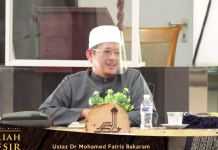This article is a summary of takeaways from Ustaz Dr Mohamed Fatris Bakaram’s Tafsir Online Lecture on 30th August 2020. Summaries of previous lectures on Surah Maryam and Surah Taha and Surah Al-Ambiya’ can be found here. This lecture is a continuation of the previous lecture on Surah Al-Hajj.
Lessons from Surah Al-Mu’minun (Verses 1-2)
This article is a summary of takeaways from Ustaz Dr Mohamed Fatris Bakaram’s Tafsir Online Lecture on 30th August 2020. Summaries of previous lectures on Surah Maryam, Surah Taha, Surah Al-Anbiya’ and Surah Al-Hajj can be found here.
The Revelation of Surah Al-Mu’minun
So before we begin on the tafsir of a new Surah, let me start with a short story. This story was narrated by Imams Ahmad, Hakim, An-Nasa’i, Tirmidhi and Al-Baihaqi in their hadith collections.
Umar RA narrated an incident that happened while he and some companions had been sitting in the company of the Prophet SAW. They saw that the Prophet SAW was receiving new revelation. They said they could hear a buzzing sounds, likened to a bee’s buzzing, in the proximity of Rasulullah SAW.
There were other narrations that mentioned how the Prophet SAW would be in a state of shivering or cold sweat whenever revelation came. So, the companions noticed the signs of revelation coming and waited patiently for the Prophet SAW. When he was done, Rasulullah SAW turned to face the Qiblah, raised his hands and recited the following supplication:
للَّهُمَّ زِدْنَا وَلَا تَنْقُصْنَا وَأَكْرِمْنَا وَلَا تُهِنَّا وَأَعْطِنَا وَلَا تَحْرِمْنَا وَآثِرْنَا وَلَا تُؤْثِرْ عَلَيْنَا وَأَرْضِنَا وَارْضَ عَنَّا
“O Allah give us more (goodness, blessings, mercy and honour) and do not give us less. Honour us and do not humiliate us. Give to us and do not deprive us. Give precedence to us and do not give others precedence over us. Make us pleased (with You) and be pleased with us.” [Ahmad]
Rasulullah SAW then turned to the companions and said, “Ten verses have been revealed to me; whoever adheres to them will enter Paradise”. He then recited the first verses of Surah A-Mu’minun. Scholars say that Rasulullah SAW recited the first 11 verses of the Surah.
So Rasulullah SAW assures us that for as long as we are believers who uphold these 10 verses, then Paradise is assured for us. O Allah, make the doors of Jannah wide open to await our entrance through them. Purify out hearts and souls to make us worthy of getting your Love and Mercy, so that we may enter into Jannah. Ameen.
Authenticity of this Hadith
This hadith is regarded by many scholars of hadith as one that is not authentic because there are issues within the chain of transmission (Sanad) of this hadith. For example, one of the narrators is Yunus bin Salim, who according to Imam An-Nasa’i, is someone whose hold of hadith is not strong (Matruk). However, I still mention it because there are scholars of hadith, such as Imam Al-Hakim, who regard this hadith as authentic (Sahih).
Even if the hadith’s authenticity is weak, I still accept it because its weakness does not reach the extent of falseness (Maudhu’). The content of this hadith does not go against our fundamental beliefs in Aqidah, unlike that of the Gharaniq story (previously discussed here).
Whatever is mentioned in this hadith (regarding how revelation was received) has also been supported and described in other hadith. Whatever the Prophet was said to have mentioned regarding the verses of Surah al-Mu’minun also does not contradict with what is already reflected in the verses.
Also, none of the tafsir scholars rejected this story on its own. This is unlike the Garaniq story which had many scholars firmly opposing it. So, I do not reject this hadith, but as an adab, when sharing hadith that are not Sahih, I will mention the weaknesses of it just so you are aware of it. This is not a false hadith and is not rejected strongly by scholars. May it be of benefit to you.
Attaining Rizq from Allah
So make the du’a in this hadith often. Ask Allah SWT to increase you in His blessings towards you and not to decrease His gifts upon you. Ask that He does not block the sustenance (Rizq) that is coming to you.
At times, dear brothers and sisters, Rizq is held back from us because of our own deeds – when we do certain acts that displease Allah SWT. Sometimes, Rizq is “blocked” in a way that it still comes to us, but it does not bring about any good. Sometimes you receive what is meant for you, and you spend it, but there is no benefit to it; the money spent causes you to distance yourself from Allah SWT.
With the current economic crisis, the situation that we are in since February this year, many of us are starting to feel the brunt of it. We hear of bad news coming in about retrenchments and pay cuts. As believers, we need to stand firm in our belief that Allah SWT will provide for us. The small tests that come to us are only meant to elevate us.
What is important is that first, we accept it (Redha), and next, we put in effort. Allah SWT will provide for us, that is His promise; but you need to put in the effort. Do not sit around and wait for work and livelihood to come, thinking that Allah will provide anyway.
If you have lost your job or experienced a reduced income, if you are suffering from the effects of the economic crisis, then keep striving and searching for opportunities to earn Halal income. Do not just sit and wait. Do not be picky with selecting the opportunities that come to you. Do not be arrogant with the Rizq that Allah SWT provides for you.
May the current situation pass soon. May Allah SWT return us to a state of comfort and prosperity. May Allah SWT protect this country and its people, as well as people around the world from destruction. Ameen.
Success for the Believers
قَدْ أَفْلَحَ الْمُؤْمِنُونَ
Successful indeed are the believers. [23:1]
Allah SWT emphasises the success of the believers with the word “Qad”. This indicates that the success is sure, guaranteed and clear.
The root word of “Aflaha”(افلح) are the letters ‘fa-lam-ha’’ (ف-ل-ح) from which the word ‘Al-Falaah’ (الفلاح) is derived. Al-Falaah means success and victory. As Muslims, we call one another to success each time we sound the Azan; we say, “Haiya ‘alaa al-Falaah”, meaning, “hasten to success!”.
If you put a shiddah on the letter lam (الفلّاح), you will get the word “Al-Fallaah” meaning farmer, or “Al-Fillaahah” meaning cultivation. There is a relevance. When we talk about Falaah, meaning success, we mean that whatever a person aspires to get, whatever he dreams for is achieved – be it material wealth. such as money and crops, or immaterial hopes, such as happiness or tranquillity.
In the Arabic language, we learn that success is nothing if it is only something that is fantasised and dreamt of and is not coupled with effort. This is the concept that is accepted in Islam. It is the foundation of Tawakkal in Islam. We make du’a and dream and hope for certain things in the life of this world and the next, but Islam teaches us that what is important is not just asking for it, but also to put in effort and strive to get these results.
Success Requires Effort
So I mention the farmer here because when you watch a farmer toil away, you can see the concept of hope and aspiration, an end goal being sought after, and this is coupled with striving and work. We see farmers who after working hard, realise that perhaps the soil that they have is not suitable for agriculture. They would then travel in search of soil that works.
In another lecture at Masjid Hasanah, I mentioned how the Jews had come to Madinah over 500 years before the birth of Prophet Isa AS to find fertile soil. The Auz and Khazraj had similarly done so by migrating to Madinah and choosing to settle down there.
The soil needs to be tilled, fertilised, and weeded often, the plants defended against pests and watered suitably. Even with all of the work that is being done, there is no guarantee that the crops will thrive.
A farmer might choose the best premium seeds, but even after all of the care put into growing them, he might find that they do not grow, that their fruits may be shrunken, their leaves may be shrivelled, their flowers might not bloom. This is beyond the control of the farmer.
Likewise, as believers, we put in our 100% into our work, knowing that at the end of the day, the results are completely up to Allah SWT. Regardless of what you do and how hard you strive, the success of your endeavours are to be left to Allah SWT.
So Allah SWT guarantees success to the believers. But he does so under certain conditions.
الإيمان ما وقر في القلب وصدّقه العمل
Iman is something that is firm in our hearts and proven with actions.
Faith (Iman) is something that is firm in our hearts. It does not shake even if there were to be a quake to try to loosen it. It stands strong and unyielding regardless of what disasters strike to remove it. However, it needs to be proven with Amal. Iman without Amal is pointless.
You may say that in your heart you believe in Allah SWT, but if you do not take actions that are consistent with your faith, if you do not do deeds that please Allah SWT, then do not hope that you may get Allah SWT’s mercy to guarantee your spot in heaven.
Salah: Pillar of Islam
Amongst the many deeds that can be done by a believer to show that his faith is strong, could you guess which is the most important of them? The primary deed is prayer (Salah). Rasulullah SAW has mentioned to us:
The Salah is the pillar of the religion. Whoever upholds Salah, he upholds the religion. And whoever leaves the Salah, he destroys the religion.
Let us imagine that Jannah is our palace. We want to build a palace. Before we start building the walls and the roof, we first need to ensure that the foundation is firm. Those who want to make a bigger house need a deeper, stronger foundation. Iman is our foundation.
Before we can build further, we need to build the pillars. The pillars are then supported by the beams. Regardless of how complex your blueprint is, and the interior designs of the house are, if you do not first take care of the foundation and pillars, there will be no house to decorate.
The Prophet SAW reminds us that the first of deeds that are checked by Allah SWT is the Salah. When Allah SWT questions you, He first wants to know how you have performed in your Salah. If you pass in this aspect, He SWT facilitates the judgment of the rest of your deeds, overlooking and forgiving a few them. You are guaranteed heaven in syaa Allah. If you fail in Salah, then Allah SWT will pay close attention to whatever deeds are left.
We are taught the following du’a that is so important to practice:
اللّهُـمَّ أَعِـنِّي عَلـى ذِكْـرِكَ وَشُكْـرِك، وَحُسْـنِ عِبـادَتِـك
O Allah, help me to remember You, to give You thanks, and to perform Your worship in the best manner. [An-Nasa’i]
If you remember in the story of Prophet Ibrahim AS, we also learnt of the following du’a of Prophet Ibrahim:
رَبِّ اجْعَلْنِي مُقِيمَ الصَّلَاةِ وَمِنْ ذُرِّيَّتِي ۚ رَبَّنَا وَتَقَبَّلْ دُعَاءِ
“O my Lord! Make me one who establishes As-Salah, and (also) from my offspring. Our Lord, accept my supplication.”
[Ibrahim, 14:40]
Practice these du’as often and ask Allah SWT to accept them from us.
Khusyu’ in Salah
الَّذِينَ هُمْ فِي صَلَاتِهِمْ خَاشِعُونَ
They who are during their prayer having Khusyu’ [23:2]
The first criteria for success is Khusyu’ in Salah. The word “khashi’un” means to bow submissively. What do we lower when we bow? We lower our hearts, our gaze, our mind (our thoughts and fantasies), our ego as human beings, and lower ourselves as mere servants of Allah SWT.
Our faith is manifested through our actions. So according to this, we need to carry out our prayer, we need to establish our prayer, we need to strive to do our prayers. But Allah SWT did not use these action words when it comes to explaining Salah in this verse. Allah says, “in their prayers, they have Khusyu’”.
This is the beauty of the Arabic language. Much of its beauty is lost in translation. We only see and understand on the surface. If we investigate further deeper studies of the scholars, we realise the vastness of knowledge available in studying the Qur’an.
There can never be an end to what you can learn about the Qur’an. We as human beings, are limited in our abilities to comprehend and study. The verses of the Qur’an come from Allah SWT, whose vastness in knowledge is beyond our imagination.
When we speak of Salah, we think about the actions performed: the standing, the sitting, the ruku’, the sujud, the lifting of the finger etc. In this verse however, Allah does not highlight the actions performed in prayer, He highlights the Khusyu’. The state of the mind and heart during the prayer. The internal state of being during the Salah. This is what we should pay close attention to.
Anyone can perform Salah; this is the first stage. The next step is to uphold the Salah in being whole-hearted in carrying it out, doing your absolute best in your recitation and actions, not just rushing through the steps for the sake of it. There was an incident in the hadith where Rasulullah SAW after seeing a young man hurriedly complete his Salah, told him, “Perform your Salah, for you have not done it”.
The third stage is that in Salah, you have Khusyu’ in Salah. What do you know about Khiusyu’? When I asked the audience members to explain to me what Kihusyu’ is, these are the words they gave me: full concentration, focus, understanding the meaning, deepening, appreciation, determination, not being distracted or spacing out, internalisation, whole-heartedness, engrossed, calmness, set the world aside, attentiveness, fear etc.
My dear brothers and sisters, if you look at the words written here, you will realise that none of them are actions that we can execute or carry out. They are words that show what is within us, the states of our hearts and minds during Salah.
Khusyu’: Impossible to Attain?
The scholars say that in Salah, the first thing that disappears is Khusyu’. The steps to perform will not disappear – at the very least, we forget which raka’at we are on. Before any of the steps are forgotten, the first thing we lose is the Khusyu’.
You might say, “If this is the case, then I guess I have no hope of attaining Paradise. Looking at the phrases above it is clear that I am far from getting Khusyu’ in my Salah. So how can I be amongst those who have Khusyu’ in Salah? How can I be amongst the believers who are guaranteed Paradise?”
There is a piece of good news for you. It is that the measure of success for Allah’s servants is not based on the end product. Rather, what is measured is the effort and the steps taken in that journey. Success is not when you have reached the target. Humans are fraught with weaknesses.
The more we try to achieve, the more we do not achieve. We are imperfect. If we become perfect and purified from weakness, sin and mistakes, then Rasulullah SAW tells us that Allah SWT will replace us with a people who will make mistakes and commit sins, because Allah SWT wants His servants to seek forgiveness for their faults.
So, our awareness is our success. Do you have that desire to have Khusyu’? Are you whole-hearted in wanting it? Are you taking steps to arrive there? If you have that desire, motivation, and commitment to want to get there, then in syaa Allah, you will already be in that journey to taking the steps to getting there. Allah SWT will reward us according to the actions and steps we have taken in this journey that we are taking on with hearts full of sincerity and hope.
Rasulullah SAW mentions that a believer will always have sins that they commit occasionally. In fact, it is not uncommon for someone to have a certain sin that repeats itself. He might repent and stop for a while and then go back to it and repent and the cycle repeats. Rasulullah SAW tells us that this is normal.
But the difference is that for a believer, he wants to seek forgiveness from Allah SWT each time he commits a sin. A believer does not give up hope and get demoralised when he fails to stay away from sin. A believer knows that that is how his relationship with Allah SWT works. Each time He commits a sin, He comes to Allah lowering himself and seeking forgiveness in repentance.
Wudhu’: A Step Towards Khusyu’
There are steps to take to help us arrive at Khusyu’ but I will not be able to cover them all during our limited time here. I would like to just mention a few. I myself have not reached this stage. These are guidelines from the scholars and pious people of the past. One tip is to ensure that you are cleansed from impurities, both external and internal.
Pay close attention to your wudhu’ and perform it well. Even before Salah, you need to start being in focus during your wudhu’ and internalise the wudhu’ process as a means of purifying yourself from the sins that have dirtied you. The evidence is multiple hadith [1, 2 etc.] of the Prophet SAW which mention that when a believer performs wudhu’ his sins are washed off along with the water that cleanses his body.
So, when taking wudhu’, get present to the process of wudhu’ being a cleansing of your spiritual impurities as well. When you are gargling water, get present to the fact that you are not only washing off any remains of food or unpleasant substances in your mouth, but also the dirty words that have passed through the lips and the many lies and sins the tongue has committed – that gets washed off too.
When you wash your face, get present to the many things your eyes have exposed themselves to that they should not have. Ask Allah SWT to remove these sins from your eyes so that you may be able to face Him in a state that is purified. Likewise, cleanse your hands, your ears, your mind etc.
When we wash our hands, feet, ears, and face, we are not actually washing away much physical dirt and filth. There is no pungent smell in our nose or on our hands that we need to get rid of. No, if it was about washing off filth, then we should all be washing our armpits, that is where much of the body odour comes from. The armpits are not part of the obligatory steps for washing though. And this is why: the armpits are never used to perform sin.
Therefore we are taught to recite this du’a after we complete our wudhu’:
اللّهُـمَّ اجْعَلنـي مِنَ التَّـوّابينَ
O Allah, make me amongst those who always turn to You in repentance,
وَاجْعَـلْني مِنَ المتَطَهّـرين
and make me amongst those who are purified.
There is a question regarding taking Wudhu’ before Salah. Let us say that you took Wudhu’ before performing Maghrib prayers, and the time for Isya’ arrives and you still have your Wudhu’ from Maghrib. Should you retake your Wudhu’? Scholars differ in their opinion of this matter.
Some scholars say it is better not to retake your Wudhu’ because it is regarded as a form of wastage. Water is a precious resource and there is no need to use up more of it when it is not a necessity. The previous Wudhu’ is still valid after all. Some scholars disagree, saying you should take Wudhu’ again because of the benefits of Wudhu’. It cleanses and purifies us from our sins and there is much good to be gotten out of it. So perform Wudhu’ whenever you can.
We do not want to get into the arguments here. Choose what you think is best and agree to disagree and respect the opinions of others on this topic.
Closing Du’a
May Allah SWT accept from us our deeds and grant us what is best for us in this world and the next. May He guide our thoughts and actions and preserve us from harm. There are many challenges we need to take on and trials we must face in life. Our own desires often seize us away from our path towards Allah. The dazzling glitter of the world distracts us from what is important. The seemingly endless battles we must face sometimes demoralise us and perturbs our hearts, making us feel like we are lost and distant from Allah SWT.
May Allah SWT hold onto us and pull us back to Him. May Allah SWT plant Hidayah into our hearts whenever we stray away so that we may quickly come to a realisation and return to the path of faith. May Allah SWT plant in our hearts a deep desire to keep striving to upgrade our relationship with Allah SWT in taking action that pleases Him. Ameen.
My dear brothers and sisters, this life is not easy. Paradise is not cheap. But Allah SWT’s Mercy flows endlessly. Allah SWT will never leave us for as long as we do not stop hoping and asking from Him SWT.
——————–
Summary by: Arina Adom
Arina Adom is a lover of learning who takes on the world with an open mind. Resourceful and adaptable, always ready to take on new challenges. Comfortable working with diverse groups of people, yet able to work independently. Thrives under pressure. Currently seeking a meaningful career that enables her to impact lives directly and bring about positive changes in the lives of others in the community.
Arina graduated with a degree in Science ( Hons ), Life Science from NUS. She is currently taking a diploma in Quran and Sunnah Studies from Al Zuhri.
Watch Kuliah Tafsir again at
Masjid Darul Makmur’s Youtube
Watch and follow Kuliah Tafsir weekly
every Sunday after solat Maghrib

organised by Masjid Darul Makmur
Your contributions are appreciated. Get more details by clicking the image below.











